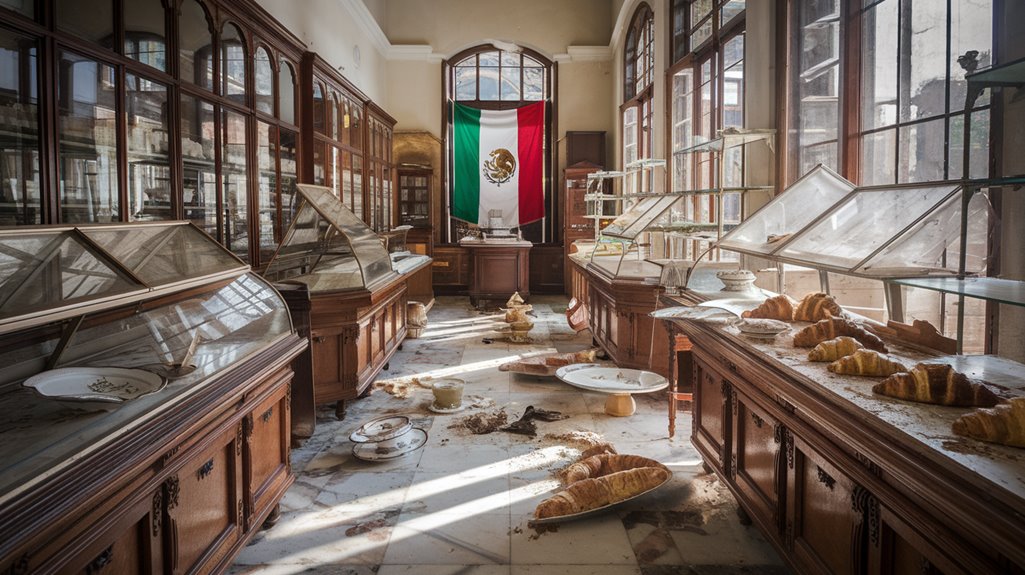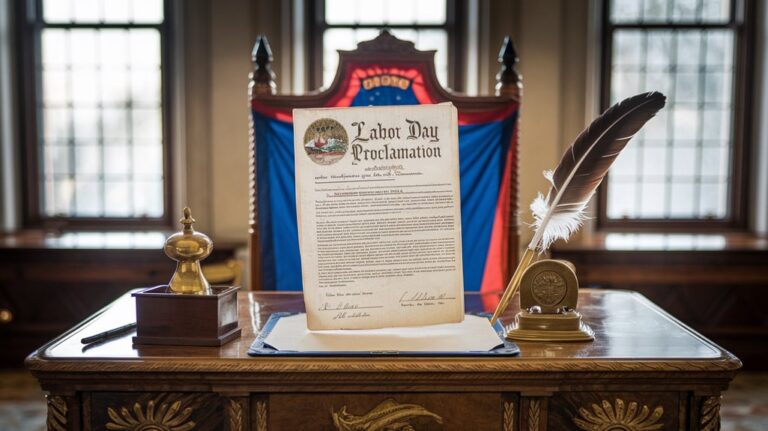The Pastry War: When Stolen Sweets Ignited a War Between Nations
Did you know that a $600 pastry shop claim ballooned into a $600,000 diplomatic crisis between France and Mexico in 1838? You'd think both nations would have bigger concerns than a ransacked bakery, but this seemingly trivial incident exposed deeper tensions about national sovereignty and international respect. The story of how stolen cakes and broken china led to warships, naval blockades, and the first French intervention in Mexico will show you just how quickly minor disputes can spark international conflicts.
The Sweet Shop Incident That Sparked International Tension

When Mexican officers ransacked a French pastry shop in Tacubaya during the late 1820s, they couldn't have known their actions would spark an international conflict.
The shop's owner, Monsieur Remontel, demanded 60,000 pesos in compensation – a sum far exceeding his business's actual value. This seemingly minor incident quickly escalated into a diplomatic crisis when Mexico refused to pay, citing its policy against compensating for civil disturbance damages. King Louis-Philippe of France used this incident as an excuse to pursue deeper political motives.
You might wonder how a vandalized pastry shop led to war, but this incident served as the perfect catalyst for France to address broader grievances. The incident occurred during a time of widespread political instability throughout Mexico, making it difficult for the government to maintain order.
The French government seized the opportunity to demand 600,000 pesos from Mexico, bundling Remontel's claim with other alleged damages to French citizens.
These mounting international tensions would soon transform a local dispute into a full-scale military conflict.
From Pastries to Politics: The Escalation of Franco-Mexican Relations
You'll find that what began as Remontel's 60,000-peso claim quickly transformed into France's larger demand for 600,000 pesos, exposing deeper economic motivations beneath the surface.
When Mexico refused to pay, citing both financial constraints and national pride, France saw an opportunity to flex its diplomatic muscle.
Six thousand French nationals resided in Mexico at the time, representing the largest European population with significant financial interests at stake.
They imposed a naval blockade, hoping to force Mexico's compliance. The bombardment of Veracruz began on November 27, 1838, marking a dramatic intensification of hostilities.
The conflict wasn't really about pastries at all – it exemplified France's broader ambitions to assert global influence while capitalizing on Mexico's post-independence vulnerabilities.
Through British mediation, the dispute eventually ended with Mexico agreeing to pay, but the incident had already sown seeds of mistrust that would shape future Franco-Mexican relations.
Naval Blockades and Battle for Veracruz
French warships initiated a decisive naval campaign in November 1838, positioning their fleet along Mexico's coastline under Admiral Charles Baudin's command. Similar to Maximilian's arrival in Veracruz years later in 1864, their naval strategy focused on blockading key ports, effectively strangling Mexico's maritime trade and economy. The French fleet demanded 600,000 pesos in damages from Mexico as compensation for French citizens' losses.
The conflict reached its peak during the siege of Veracruz on November 27, when French forces bombarded the fortress of San Juan de Ulúa. You'll find it interesting that General Santa Anna, leading the Mexican defense, lost his leg in battle – an injury that would become legendary.
Despite fierce Mexican resistance, the economic impact of the blockade proved devastating. The siege's outcome pressured Mexico into negotiations, leading to a British-mediated peace treaty in March 1839.
While the French suffered 92 casualties, Mexico endured 224, marking a costly end to this maritime confrontation.
British Mediation and the Price of Peace
As naval hostilities escalated between France and Mexico, Britain's diplomatic intervention emerged as a game-changing force in the conflict.
With substantial investments in Mexican silver mines and growing concerns about trade disruptions, Britain couldn't afford to stay on the sidelines. Lord Palmerston's offer to mediate proved essential in bringing both parties to the negotiating table.
Through careful diplomatic negotiations, Britain helped broker a peace treaty on March 9, 1839. After Mexican troops suffered heavy losses and Santa Anna lost his leg, peace became increasingly urgent. The French navy's capture of Veracruz had severely crippled Mexico's maritime capabilities.
You'll find it remarkable that Mexico agreed to pay 600,000 pesos in damages – considerably less than France's initial demands. The settlement not only restored economic stability but also opened doors for increased French investment in Mexico.
For Britain, the successful mediation protected their commercial interests while demonstrating their diplomatic influence in the region.
Legacy of the Most Unusual War in History

While seemingly trivial disputes rarely spark international conflicts, Mexico's refusal to compensate a French pastry chef triggered one of history's most peculiar wars, leaving lasting economic and diplomatic scars.
You'll find the war's economic ramifications extended far beyond its brief duration. Mexico's already fragile economy suffered severely under the French blockade, with trade disruptions affecting merchants across borders and a crushing 600,000-peso settlement deepening the nation's financial woes. During this turbulent period, Mexico resorted to smuggling vital goods to survive.
The diplomatic challenges proved equally significant, as you'll see how the conflict strained Mexican-French relations and drew the attention of major powers like Britain and the United States.
Perhaps most importantly, this unusual war set a concerning precedent for future French interventions in Mexico, while exposing the vulnerability of Latin American sovereignty to European powers.










